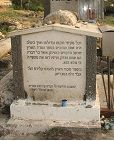A Short Tribute
Hacham Haim Aboulafia, son of Moshe, was born in Hebron in 1660. While he was still a youth, his family moved to Jerusalem, where he studied at the Beit Yaakov yeshiva, principally with Hacham Moshe Galanti; Hacham Hizkiyahu de Silva, author of Pri Hadash, was his colleague and teacher. In 1699 he moved to Greece and settled in Salonica.
In 1712, the Jews of Hebron, who were heavily taxed by the Ottoman regime, asked that he go to Turkey on a fundraising mission for them and he traveled to Izmir, where he was ordained to the rabbinate. In 1718, after spending some six years in Turkey, he returned to the Land of Israel, and settled in Safed, officiating as the city's chief rabbi. In 1721, he returned once again to Izmir, to serve as the city's rabbi.
In 1738, Dahr El Omar, the Druze governor of the Galilee, wrote Hacham Haim Aboulafia and proposed that he renew the Jewish settlement in Tiberias, where the population had declined almost to the point of obliteration. Hacham Haim Aboulafia returned to the Land of Israel in 1740, settling in Tiberias, and worked to renew its Jewish community. Among other achievements, he founded the Etz Haim synagogue, a bathhouse, had shops organized for a market, and set up a sesame oil press.
Hacham Haim Aboulafia passed away on 7 Nissan 5504 (1744) and was buried in the old cemetery in Tiberias. After he died, his sons Yitzhak and Issachar continued to lead the Tiberias Jewish community. Hacham Haim Moda'i, his student, is considered one of the great halakhic responders of his generation.
Hacham Haim Aboulafia authored Yosef Lakakh, Etz Haim and Hanan Elohim on the Torah, Yashresh Yaakov and Shevut Yaakov on the Talmudic legends, published together under the title Ein Yaakov, and Mikra'ei Kodesh on the festivals and holidays.
